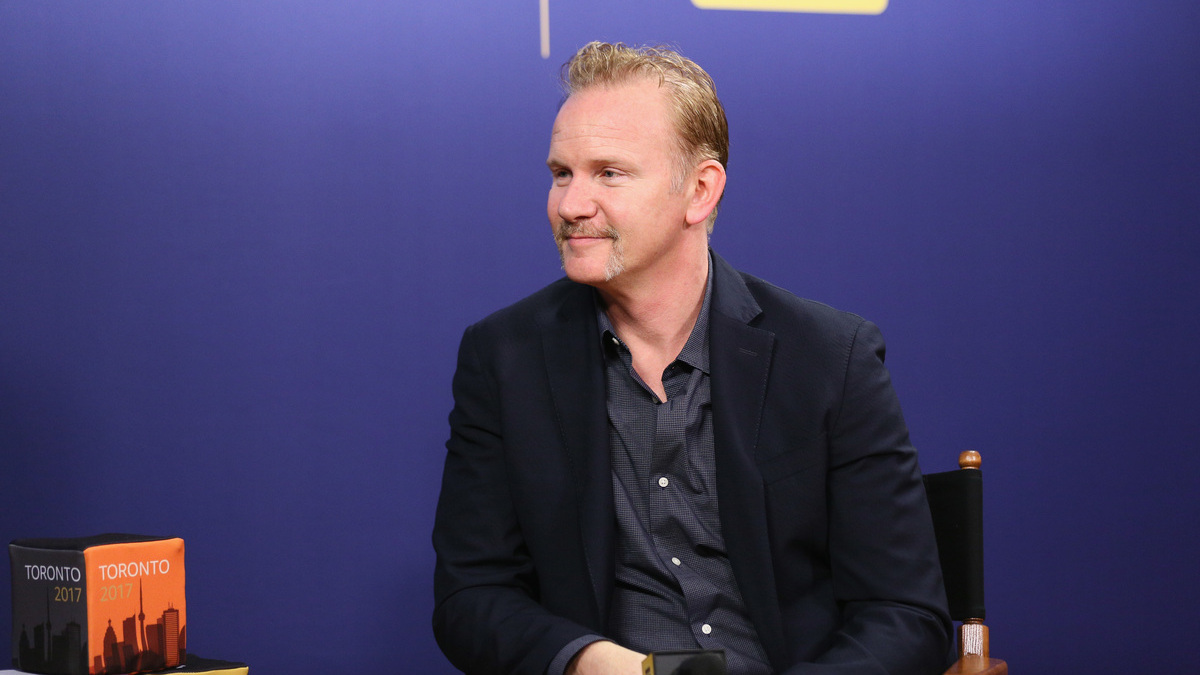Spurlock’s Biography and Early Life
Spurlock was born in 1969 in Huntington, West Virginia, to a working-class family. His father was a coal miner, and his mother was a nurse. Spurlock grew up in a small town, and he attended public schools. He was a good student, and he was involved in several extracurricular activities, including football and track.
After graduating from high school, Spurlock attended Marshall University in Huntington. He majored in journalism, and he worked as a reporter for the student newspaper. After graduating from college, Spurlock worked as a reporter for several newspapers in West Virginia and Ohio. He also worked as a producer for a local television station.
In 2004, Spurlock directed and starred in the documentary film Super Size Me. The film followed Spurlock as he ate nothing but McDonald’s food for 30 days. The film was a critical and commercial success, and it helped to raise awareness of the health risks of fast food.
After Super Size Me, Spurlock directed and starred in several other documentaries, including Where in the World Is Osama bin Laden? (2008), The Greatest Movie Ever Sold (2011), and POM Wonderful Presents: The Greatest Movie Ever Sold (2012). He also wrote several books, including Don’t Eat This Book (2005) and Fast Food Nation (2006).
Spurlock was a vocal advocate for healthy eating and public health. He was also a strong critic of the fast food industry. He died in 2017 at the age of 49 from an accidental drug overdose.
Spurlock’s Education
Spurlock attended Marshall University in Huntington, West Virginia, where he majored in journalism. He worked as a reporter for the student newspaper, The Parthenon. After graduating from college, Spurlock worked as a reporter for several newspapers in West Virginia and Ohio. He also worked as a producer for a local television station.
Spurlock’s Career
In 2004, Spurlock directed and starred in the documentary film Super Size Me. The film followed Spurlock as he ate nothing but McDonald’s food for 30 days. The film was a critical and commercial success, and it helped to raise awareness of the health risks of fast food.
After Super Size Me, Spurlock directed and starred in several other documentaries, including Where in the World Is Osama bin Laden? (2008), The Greatest Movie Ever Sold (2011), and POM Wonderful Presents: The Greatest Movie Ever Sold (2012). He also wrote several books, including Don’t Eat This Book (2005) and Fast Food Nation (2006).
Spurlock was a vocal advocate for healthy eating and public health. He was also a strong critic of the fast food industry. He died in 2017 at the age of 49 from an accidental drug overdose.
Spurlock’s Personal Life
Spurlock was married to Alexandra Jamieson, a documentary filmmaker. They had two children. Spurlock was a private person, and he rarely spoke about his personal life. However, he did say that his family was the most important thing to him.
Spurlock’s Filmmaking Career: Spurlock Death

Spurlock death – Morgan Spurlock’s filmography is characterized by its focus on social and cultural issues, often exploring topics related to health, consumerism, and the food industry. His documentaries are known for their immersive and engaging style, using a combination of interviews, personal experiments, and observational footage.
Spurlock’s most famous documentary, Super Size Me (2004), followed his 30-day experiment of eating only McDonald’s food. The film became a critical and commercial success, raising awareness about the health risks associated with fast food consumption. Spurlock’s subsequent documentaries have continued to tackle important issues, including the impact of processed foods (Pom Wonderful Presents: The Greatest Movie Ever Sold, 2011), the role of money in politics (Citizen Koch, 2013), and the opioid crisis (The Man Who Saw Too Much, 2019).
Themes and Styles
Spurlock’s documentaries often explore the complex relationship between individuals and society, examining how personal choices and behaviors can have broader implications. He uses a variety of filmmaking techniques to engage viewers, including humor, satire, and personal anecdotes. Spurlock’s films are often characterized by their immersive and observational style, allowing viewers to experience the issues he explores firsthand.
Approach to Filmmaking
Spurlock’s approach to filmmaking is rooted in his belief in the power of storytelling to educate and inspire change. He often uses personal experiments and immersive experiences to illustrate the issues he explores, creating a strong connection with his audience. Spurlock’s documentaries are not simply indictments of specific problems but also serve as catalysts for dialogue and action.
Super Size Me and its Impact
Morgan Spurlock’s “Super Size Me” documentary, released in 2004, became a groundbreaking exploration of the detrimental effects of fast food consumption on human health. The film’s premise was simple yet powerful: Spurlock would consume only McDonald’s meals for 30 consecutive days to demonstrate the physical and psychological consequences.
Throughout the experiment, Spurlock’s health deteriorated rapidly. He gained over 20 pounds, experienced mood swings, and developed liver damage. The documentary vividly captured the negative impact of excessive fast food consumption, exposing the hidden dangers lurking within seemingly innocuous meals.
Reception and Influence
“Super Size Me” sparked widespread outrage and public debate about the fast food industry’s practices. It played a pivotal role in raising awareness about the dangers of processed foods, trans fats, and excessive calorie intake. The film’s influence extended beyond the United States, prompting similar documentaries and policy changes in other countries.
In response to the public outcry, McDonald’s removed the “Super Size” option from its menu and made healthier choices available. Other fast food chains followed suit, introducing salads, fruits, and healthier side options to their offerings.
Spurlock’s Recognition
“Super Size Me” catapulted Spurlock into the spotlight as a leading advocate for public health. He received numerous awards and accolades for his work, including the Sundance Film Festival Audience Award and the BAFTA Award for Best Documentary. The film’s success established Spurlock as a respected filmmaker and a tireless campaigner against unhealthy eating habits.
Other Notable Works and Accomplishments
Beyond Super Size Me, Morgan Spurlock has produced and directed numerous other documentaries and projects that have explored a wide range of social issues and topics.
Food and Nutrition
- The Greatest Movie Ever Sold (2011): Examined the pervasive influence of product placement and advertising in the film industry.
- POM Wonderful Presents: The Greatest Movie Ever Sold (2011): A satirical spin-off of the previous documentary, highlighting the role of corporate sponsorship in shaping media content.
- Fed Up (2014): Investigated the role of the food industry in promoting unhealthy diets and contributing to the obesity epidemic.
Social and Environmental Issues
- Where in the World Is Osama Bin Laden? (2008): Explored the aftermath of the 9/11 attacks and the search for Osama bin Laden.
- Mansome (2012): Examined the cultural phenomenon of metrosexuality and the evolving definitions of masculinity.
- Rats (2016): Investigated the environmental and public health implications of urban rat infestations.
Advocacy and Social Causes
Spurlock has been an active advocate for various social causes throughout his career. He has spoken out against obesity, childhood hunger, and corporate influence in the food industry.
In 2005, he founded the Cinema Libre Studio, a non-profit organization dedicated to supporting independent filmmakers and distributing socially conscious documentaries.
Spurlock’s work has received critical acclaim and has contributed to raising awareness and sparking dialogue on important social issues.
Controversies and Criticisms
Spurlock’s work and personal life have not been without controversies. His methods, ethics, and representation of issues have drawn criticism from various quarters.
Methods and Ethics, Spurlock death
Spurlock’s methods in his documentaries, particularly Super Size Me, have been criticized for being extreme and potentially harmful. Critics argue that his decision to consume only McDonald’s food for 30 days, without exercising, was not a fair or accurate representation of the typical fast-food consumer’s experience. They also question the ethics of subjecting himself to such a potentially unhealthy diet for the sake of a film.
Representation of Issues
Spurlock has also been criticized for his representation of issues in his documentaries. Some critics argue that he oversimplifies complex problems, such as obesity and the fast-food industry, and fails to adequately address the broader social and economic factors that contribute to them. Others accuse him of sensationalizing issues to attract attention and ratings.
Impact on Legacy
These controversies have undoubtedly shaped Spurlock’s legacy. While he is widely recognized for raising awareness about important issues, his work has also been criticized for its sensationalism and lack of nuance. Ultimately, Spurlock’s legacy is a complex one, reflecting both the impact of his work and the controversies that have surrounded it.
Spurlock’s Legacy and Influence
Morgan Spurlock’s innovative filmmaking and thought-provoking documentaries have left an indelible mark on the industry and society at large. His groundbreaking work has sparked public discourse, raised awareness about critical issues, and continues to inspire filmmakers and activists alike.
Contributions to Filmmaking and Documentary Storytelling
Spurlock’s unique approach to documentary filmmaking, which often involves immersive experiences and personal experiments, has revolutionized the genre. His films are characterized by their raw authenticity, compelling narratives, and ability to connect with audiences on a visceral level. Spurlock’s work has expanded the boundaries of documentary storytelling, proving that documentaries can be both entertaining and socially impactful.
Impact on Public Discourse and Social Change
Spurlock’s films have sparked important conversations and brought attention to pressing social issues. His work on topics such as obesity, consumerism, and corporate influence has raised awareness and fueled public debate. “Super Size Me” alone has been credited with influencing changes in fast food industry practices and promoting healthier eating habits. Spurlock’s films have empowered audiences to become more informed and critical consumers, and have contributed to social and political change.
Continuing Inspiration and Provocation
Spurlock’s legacy extends beyond his individual films. His work continues to inspire a new generation of filmmakers and activists who are committed to using their platforms to explore important issues and make a difference in the world. Spurlock’s unwavering dedication to truth-telling and his willingness to tackle controversial topics have set a high standard for documentary filmmaking, and his work will continue to provoke thought and inspire action for years to come.
